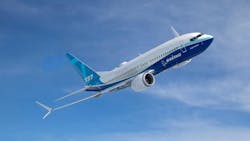European aviation safety agency sets strict demands for Boeing 737 MAX return to flight
SEATTLE - Europe’s aviation safety agency, which is conducting its own independent review of Boeing’s grounded 737 MAX, is not satisfied with a key detail of Boeing’s fix to the jet. It wants Boeing to do more to improve the integrity of the sensors that failed on the two fatal crashes in Indonesia and Ethiopia, killing 346 people. And it’s demanding that Boeing demonstrate in flight tests the stability of the MAX during extreme maneuvers, not only with Boeing’s newly updated flight-control system but also with that system switched off, writes Dominic Gates for the Seattle Times. Continue reading original article
The Intelligent Aerospace take:
September 6, 2019-Patrick Ky, executive director of the European Union Aviation Safety Agency (EASA) presented his agency's terms for returning the Boeing 737 MAX to service and to allow flight over European airspace. Gates notes that typically agencies like EASA and others overseas generally "follow the FAA's lead," but the fatal crashes has impacted trust in the American regulator's certification process. EASA has stipulated that it must approve the changes proposed by Boeing independent of the FAA and impose broader independent review of the MAX.
On Wednesday, the FAA released a statement, but did not specifically address EASA's stipulations.
“We aren’t going to comment on specific details about ongoing discussions,” the FAA said in a statement. “The FAA has a transparent and collaborative relationship with other civil aviation authorities as we continue our review of changes to software on the Boeing 737 MAX…Each government will make its own decision to return the aircraft to service based on a thorough safety assessment.”
Related: New flaw discovered on Boeing 737 Max, sources say
Jamie Whitney, Associate Editor
Intelligent Aerospace
